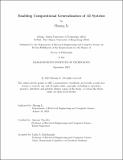| dc.contributor.advisor | Torralba, Antonio | |
| dc.contributor.author | Li, Shuang | |
| dc.date.accessioned | 2023-11-02T20:07:52Z | |
| dc.date.available | 2023-11-02T20:07:52Z | |
| dc.date.issued | 2023-09 | |
| dc.date.submitted | 2023-09-21T14:26:16.083Z | |
| dc.identifier.uri | https://hdl.handle.net/1721.1/152678 | |
| dc.description.abstract | A vital aspect of human intelligence is the ability to compose increasingly complex concepts out of simpler ideas, enabling both rapid learning and adaptation of knowledge. Despite their impressive performance, current AI systems fall short in this area and are often unable to solve tasks that fall outside of their training distribution. The work contained in this thesis aims to bridge this gap by incorporating compositionality into deep neural networks, thereby enhancing their ability to generalize and solve novel and complex tasks, such as generating 2D images and 3D assets based on complicated specifications, or enabling humanoid agents to perform a diverse range of household activities. The implications of this thesis are far-reaching, as compositionality has numerous applications across fields such as biology, robotics, and art production. By significantly improving the compositionality ability of AI systems, this research will pave the way for more data-efficient and powerful models in different research areas. | |
| dc.publisher | Massachusetts Institute of Technology | |
| dc.rights | In Copyright - Educational Use Permitted | |
| dc.rights | Copyright retained by author(s) | |
| dc.rights.uri | https://rightsstatements.org/page/InC-EDU/1.0/ | |
| dc.title | Enabling Compositional Generalization of AI Systems | |
| dc.type | Thesis | |
| dc.description.degree | Ph.D. | |
| dc.contributor.department | Massachusetts Institute of Technology. Department of Electrical Engineering and Computer Science | |
| dc.identifier.orcid | https://orcid.org/0000-0002-7276-5032 | |
| mit.thesis.degree | Doctoral | |
| thesis.degree.name | Doctor of Philosophy | |
